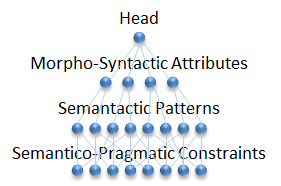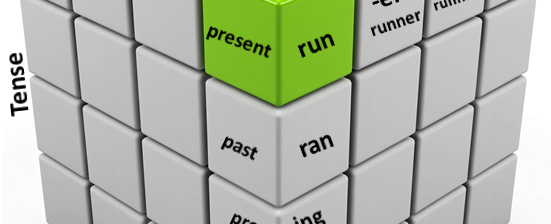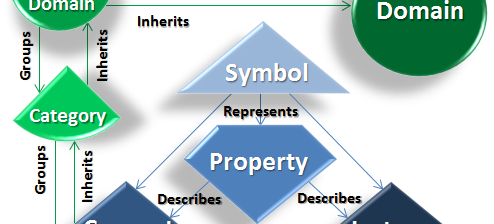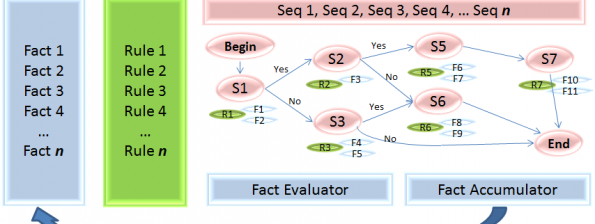Tag Archives: rules
23 Feb Inference in Knowledge Apps

In Section 5 we discussed different kinds of knowledge, including existential or hierarchical knowledge and causal knowledge. In Section 7 we discussed modeling approaches and search techniques that could be applied to any kind of knowledge. We saw that causal knowledge can be modeled as chains of causes and effects, and that existential knowledge can be […]
13 May Patterns at the Boundaries

Morphological Patterns As we have shown in prior posts, we mentally process patterns both at a physical level between neurons and in brain layers, and at a cognitive level in recognition and reasoning. 3-DG uses attributes, patterns and constraints for morphological analysis, as well as analysis at other levels and between other strata. The 3-DG lexicon is organized […]
08 May Three-Dimensional Model of Language

Topographical maps of concepts in a text provide useful views of language. Fortuna et al in Semantic Knowledge Management (pp. 155-169) describe how three-dimensional topic maps can both give meaningful insights into clusters of related content, such as news stories or published papers. I have frequently stressed the importance of concept associations in the brain, in cognitive […]
11 Mar Joe’s Theory of Everything

While my teachers explained that language is about nouns and verbs, I think language is about symbolically representing everything and communicating about anything to anyone. There are many ways to look at the milieu in which we live from the tiniest sub-atomic particle on up. One way is to look at the larger context of […]
05 Feb Rings of Power: Workflow and Business Rules

Gandalf the Wizard explained the writing on the “One Ring”: “One Ring to rule them all, One Ring to find them, One Ring to bring them all and in the darkness bind them“ Such a ring would be a nice thing to have, as long as it didn’t make you into a fascist – the […]
22 Aug Unlocking the Power of Unruly Systems

Rules are the basis of all good decisions. Humans learn learn them through observation and nurture. Can systems do the same thing – can they learn through observation and nurture? I propose that they can. At it’s simplest, a rule takes the form of a premise (“IF clause”) and conclusion (“THEN clause”) and can be stated in natural […]
26 Feb Choosing an Ontology Framework

Ontology is a knowledge representation language like Roger Schank‘s Semantic Networks and John Sowa‘s Conceptual Graphs or Doug Lenat‘s Semantic Web. An Ontology framework is the model (structure, function and content definition) in which you choose to build your ontology. Like a Relational Database or an Object Oriented Programming Language, an ontology has defined structures, functions […]
12 Nov Context Powers Backward Chaining Logic

A popular success strategies book suggests that if we “Begin with the End in Mind” we are likely to get where we’re going more consistently. We wander less if we think about what we want at the end from the very first steps of our journeys. Context helps us do that. Human behaviorists and philosophers have […]
12 Jun To Choose or not to Choose

Leg-room, anyone? The CEO of a major Airline recently stated that a-la-carte pricing of flight upgrades (such as extra baggage, preferred seating and food) is better because Americans demand “choice“. I remember my knee-jerk reaction: “Yeah – and they are choosing discount airlines that don’t charge for what was once part of the bargain.” It […]





